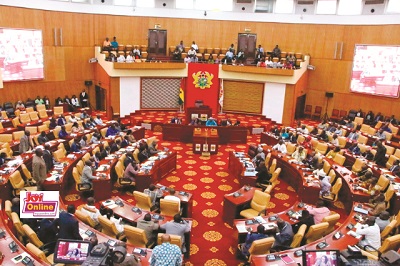
I know that the results of some constituencies are in dispute. But for now, according to EC declaration,NDC has 137 seats and NPP has 137 seats in the 8th Parliament of the Fourth Republic. This is a complete legislative stalemate! It has never happened before in the political history of Ghana. Strangely our prophets and seers have been overtaken by circumstances beyond their control. They did not see it coming and neveralerted us about it and left us in the dark.What went wrong? Some call this stalemate a “hung parliament.” No, this is more than a hung parliament.We know that hung Parliaments have no clear cut majority but have precedents we can refer to; not this strange political phenomenon we now have. It has no identity or name. Our political scientists should quickly coin a name for it.
I have carefully searched and scrutinized the Standing Orders of Parliament and the 1992 Constitution. They are completely blank on the issue. There is nothing in thereto show how to regulate and manage such a stalemate parliament. For the first time, I am afraid,there may not be a Majority or Minority in Parliament. I find this extremely interesting and intriguing.
The Independent member cannot cure the stalemate because his stand will not create, in the true sense of the word, a majority or a minority in Parliament. Note that he cannot JOIN the NPP. If he does he will automatically lose his seat. So he can only sit and work with the NPP. Hebecomesthekingmaker only when voting or decision making arises. Even here, where crucial and important decisions require 2/3 majoritythe Independent member is of no use! What a Parliament we are going to have! I wished I were there to experience it.
What about a Majority Leader? Of course, if there is no majority in parliamenthow can there be a Majority Leader? This creates another problem of who is going to manage government business in Parliament. And will the Ministry of Parliamentary Affairs survive this stalemate? What has happened is unprecedented and has not been anticipated. In the Consultative Assembly such a situation never crossed the mind of members so no remedy was put in place. It shows that members of the Assembly were mere mortals and their knowledge aboutfuture parliaments was extremely narrow and limited.
I have not given up my search so I am now searching the parliamentary literature and records ofthe old parliaments like that of Britain and the USA. So far, I have not seen anything which equals what has happened in Ghana. Elsewhere, I have seen governments with a minority in Parliament and I have learnt and heard about hung parliaments but I am yet to see a government with a stalemate parliament.This means that even before the new Parliament starts work its Standing Orders must be reviewed, revised and adjusted to accommodate and cater for this “new normal”
Some Ghanaians are rejoicing about the new development. They call it a new beginning and they are excited about it. Their reason is that Parliament will be more independent, effective and purposeful; that Parliament will no longer play second fiddle to the executive; thatdecisions will now be based on facts and not only on political expediency; that there will be more negotiation, compromise and tolerance; that there will be more consensus building in Parliament. I am not so sure about that but, well, we wait patiently to see what will happen.
Others are a bit more skeptical, cautious and,even, apprehensive. They think that the stalemate is very dangerous because it can cause confusion and disorder which will result infrequent boycotts, rioting and physical confrontation in parliament. They warn that if care is not takenthe government in power will beheld to ransomand will become ineffective, even dysfunctional, and cannot even pass its annual budget or contract loans for development.You may recall that the inability of Limman Government to pass its annual budget was partly responsible for its collapse. Of course, these are real concerns and fears but, in my view, exaggerated. Whatever it is, government should not take them for granted. It must quickly reposition itself and work out a plan or strategy to manage a stalemate parliament. I am thinking that the 1992 Constitution has given the Executive such enormous, overbearing powers and financial muscles that it can maneuver and counter any opposition and obstacles created by the stalemate parliament.
Will this stalemate cure the chronic absenteeism in Parliament? Somehow, yes, but not completely. The majority of ministers will still be appointed from Parliament. And these ministers will have to do their job so inevitably some of them will still skip going to Parliament unless there is an urgent business and they have to be whipped to attend. The Ministers will also be compelled to limit their foreign travels. What about the backbenchers who are not ministersbut they scarcely attend Parliament? This time the Whips will have to work extra hard to ensure that members attend parliament regularly. There must also be a strong liaison between the political parties and their members in parliament.It should not be business as usual!
How will the parliamentary committees be constituted and who will chair them? Will they, on a lighter note, opt for co-chairmanship? How will foreign delegations and membership of Africa/ECOWAS Parliaments be formed? This seems to be another problem that needs to be solved quickly by parliament itself. That is why it is urgent for the Standing Orders to be amended otherwise there will be trouble. Initially, the problem can be handled through negotiation,compromise and goodwill while parliament works out new Standing Orders
How will the Speaker be elected?It is possible for the independent member to vote with the NPP to elect the Speaker by a slim majority. But in my view, in the circumstances, electing the Speaker may not be the appropriate or wise thing to do. This is a typical case where the “winner” cannot take all.Indeed, for sanity and peace to prevail in the House the Speaker and his two deputies will have to be selected and appointed by consensus through negotiation. The choice of Committee Chairmen could also be handled the same way, that is, by consensus through negotiation.
How will the Speaker behave and cope? He is not going to find things easy. As much as possible he should be a neutral umpire, be firm but fair and show a lot of maturity in his work. He will have to walk a tight rope with finesse. He will be expected to be more respectful, accommodating and more tolerant of members.An arrogant and autocratic Speaker,as previous parliaments have seen in some cases, will not survive.
Despite the challenges and concerns raised about the stalemate parliament, MPs can still be “compromised” and “controlled” by the Executive. First of all, MPs are Ghanaians and, above all, human and they are likely to succumb to temptation and arm twisting. If the Executive “treats” them well they may respond positively to government overtures. Some Ghanaians are of the view that MPs normally put their interest first.
This means that even in this stalemate parliament they are likely to put their interest above that of the nation. To date, since 1993, I have not known a situation where MPs have not united to pursue their common interest. This is likely to continue in the stalemate parliament. Mark my words.
The writer a former MP and Executive Director of Parliamentary and Governance Council





